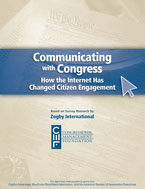 American citizens trust advocacy groups – a lot more than they trust the U.S. Congress – and appreciate these groups’ efforts to inform and mobilize citizens to contact Congress via the Internet.
American citizens trust advocacy groups – a lot more than they trust the U.S. Congress – and appreciate these groups’ efforts to inform and mobilize citizens to contact Congress via the Internet.
That’s one key takeaway from a recent survey of 10,000 citizens by the nonpartisan Congressional Management Foundation (CMF). It’s called “Communicating with Congress: How the Internet Has Changed Citizen Engagement.” If you work with advocacy or Congress, you'll find the research interesting.
“The organizers of grassroots advocacy campaigns, and the groups and causes for whom they work, play the role of trusted educators and facilitators of communications between citizens and Members of Congress,” according to the report’s authors.
The survey shows that interest groups play a crucial role in how Web users learn about and communicate with Congress. Eighty-four percent of subjects who had contacted Congress, and 44% who had not, had been prompted to do so by a third party – with interest groups being the main source of these requests. Whether Web users end up contacting Congress or not, most find information from interest groups to be more credible than information from Congress.
(The report, which studied citizens’ interactions with Congress and their corresponding views, is the companion to the 2005 CMF report, which looked at congressional staffers’ perceptions of the increasing volumes of constituent mail.)
So what was the main catalyst for Web users to contact their elected reps in Congress?
In a word -- Outrage. The survey found that interest groups evidently do a great job of whipping up anger among citizens, and this is the main reason why most of these citizens contact Congress.
At this point, CMF essentially adopts the view that anger is an unhealthy fuel for democracy, and takes advocacy groups to task. “Rather than perpetuating an ‘us’ versus ‘them’ mentality,” the CMF authors write, “the organizers of grassroots advocacy campaigns should identify opportunities for positive communications and relationship-building both to accomplish their goals and to help strengthen democracy.”
In other words: Aw shucks, can’t we all just get along?
CMF seems to be assuming that citizens can more effectively influence their elected representatives through friendly dialogue than through outrage-fueled campaigns that bring public pressure to bear, with large numbers of voters expressing their will.
What do you think? Can you catch more flies with honey than with vinegar, when dealing with politicians? Or is CMF being naïve to think these politico’s would respond to anything but a massive show of numbers by voters in their districts, threatening to throw the bums out in the next election cycle?
Dana Weissman
4
min read
New Research Findings: Advocacy Groups More Trusted
Subscribe Now
RELATED ARTICLES
Allyson Kapin
2011/2/3
4
min read
Latest Report: What Messaging and Channels Influence Congress?
The Congressional Management Foundation just released their report, Communicating with Congress: Perception of Citizen Advocacy ...
Start Reading
Allyson Kapin
2011/10/11
4
min read
Can Members of Congress Keep Up with the Digital World?
Let’s face it, the world is no picnic these days. We’re facing climate change. The world’s oceans are on the verge of being ...
Start Reading
Shayna Englin
2012/10/10
7
min read


COMMENTS